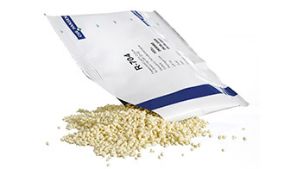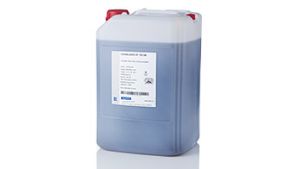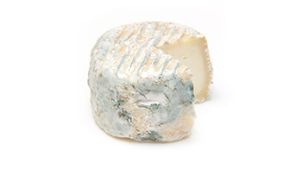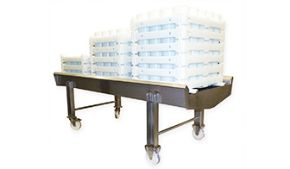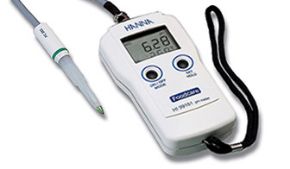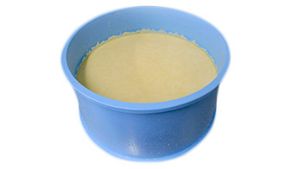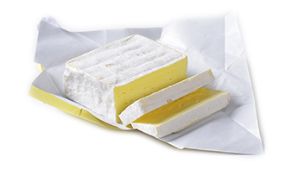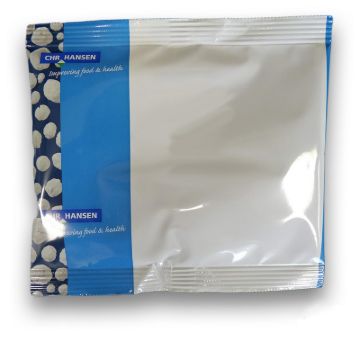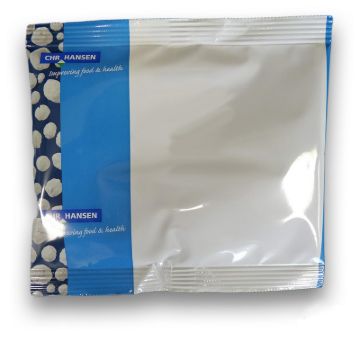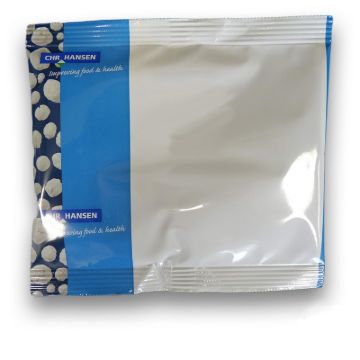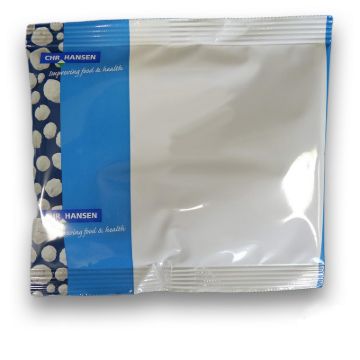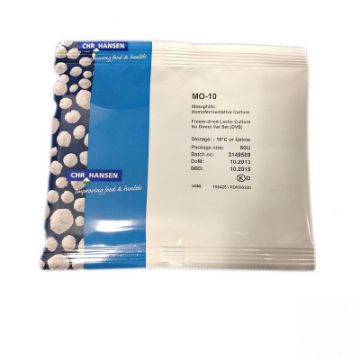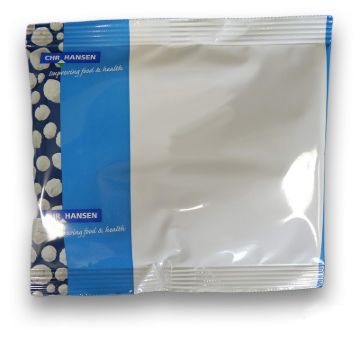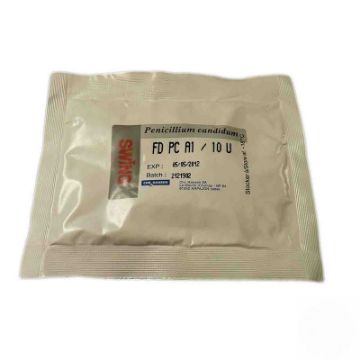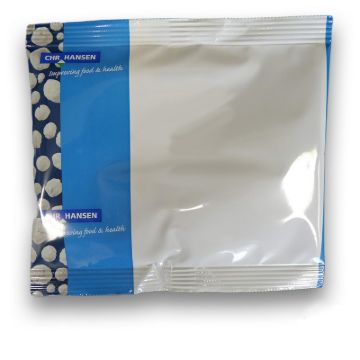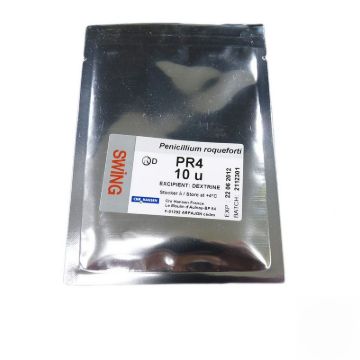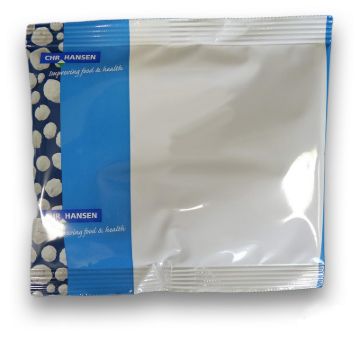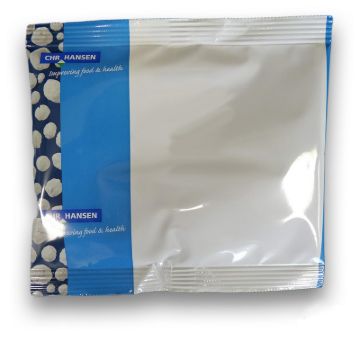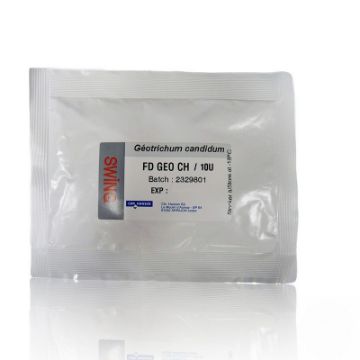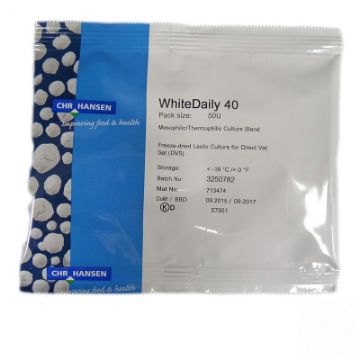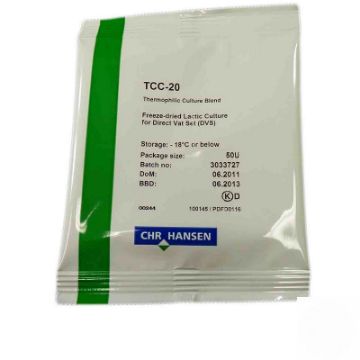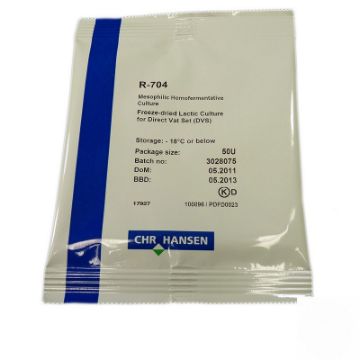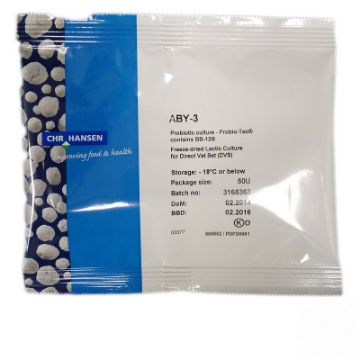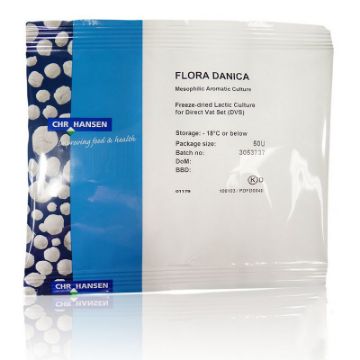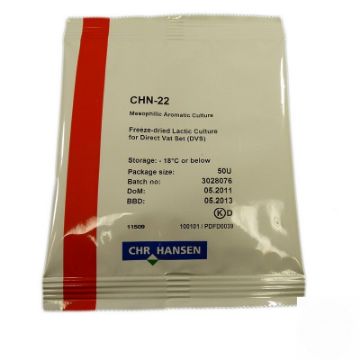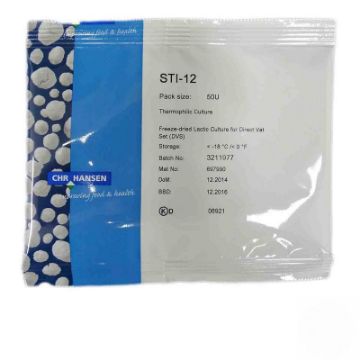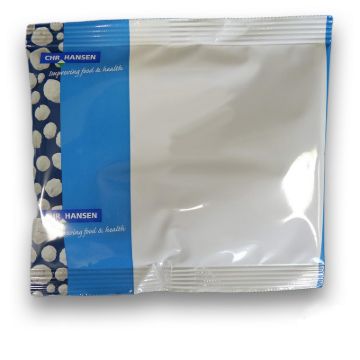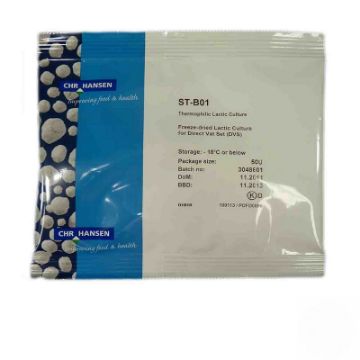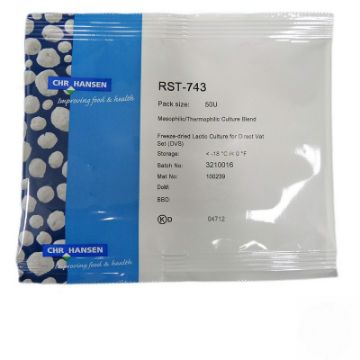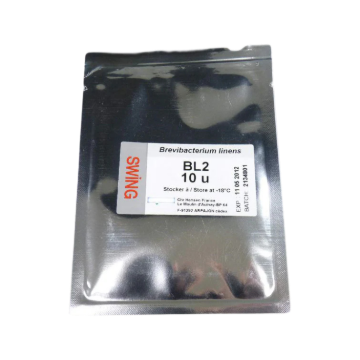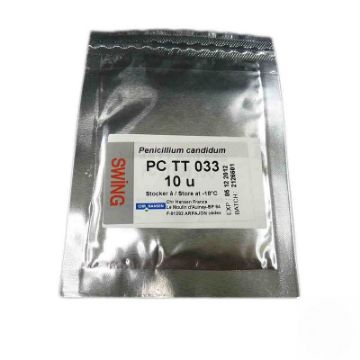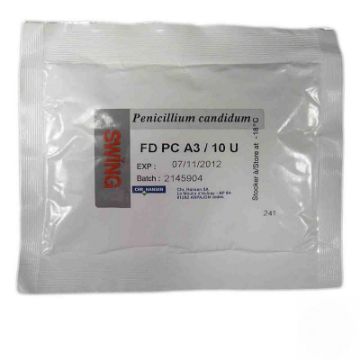Chr Hansen
Chr Hansen branded products
Vega Boost LH Frozen 250 u
The culture is designed to be used as an adjunct, in combination with a Vega™ starter or probiotic culture, in production ofthe fermented plant-based alternatives.
Vega™ Boost LH has been carefully selected for its potential to improve acidification time, and has effect on taste and flavor.
The effect is base dependent and cannot be generalized.
The culturecan be used as a single adjunct culture, or combined with other Vega™ Boost cultures.
Vega Mild Frozen 500 u
Thermophilic lactic acid culture.
This culture has been produced without the use of dairy derived ingredients in any part of the production steps.
The culture is manufactured in an environment where dairy ingredients are handled.
The culture is used in the production of yoghurt products such as drinking or stirred, made from dairy alternatives.
Vega Nu-trish BB-12 (DA) Frozen 500 g (Box of 10 pouches)
Thermophilic lactic acid culture.
The culture is a defined single strain with a long history of safe use.
Substantial clinical documentation on possible health benefits are avaliable upon request and likewise are certificates of identification and certificates of safety and origin.
BB-12® is a registred trademark of Chr.Hansen.
This culture has been produced without the use of dairy derived ingredients in any part of the production steps.
The culture is manufactured in an environment where dairy ingredients are handled.
However, the process equipment is cleaned according to our GMP standard before production of this culture.
Vega Boost LP Frozen 250 u
The culture is designed to be used as an adjunct, in combination with a Vega™ starter or probiotic culture, in production of the fermented plant-based alternatives.
Vega™ Boost LP has been carefully selected for its potential to improve acidification time, and has effect on taste and flavor.
The effect is base dependent and cannot be generalized.
The culture can be used as a single adjunct culture, or combined with other Vega™ Boost cultures.
MO-10 Freeze-dried 50 u
Mesophilic homofermentative culture, type O.
This culture contains specially selected strains chosen for their phage resistance and ability to produce lactic acid quickly.
This culture does not produce CO2.
The culture is primarily used in the manufacture of Continental cheese types with no eyes and short texture (e.g.Pecorino) and soft cheese specialties.
Vega Harmony Frozen 500 u
This culture has been produced without the use of dairy derived ingredients in any part of the production steps.
The culture is manufactured in an environment where dairy ingredients are handled.
The culture is used in the production of drinking, stirred or set fermented products made from dairy alternatives.
The dairy alternative base should have a pH ?
7 to ensure sufficient activity of the culture and it should contain enough fermentable sugar to reach pH 4.5 in the final product.
Fermentation temperature should be 38°C – 43 °C.
The final product should be stored at 8 °C.
The maximum shelf life of the final product is 60 days at 4 °C or 28 days at 8 °C.
PCA1 Swing Freeze-dried 10 u
Selected mold strains with origin in traditional cheese making.
SWING® PC culture is an essential ingredient in the ripening process of white mold cheeses for its role in coloring the surface of the cheese, and contributing to the flavor and texture, as well as protection against contaminants.
The strains may be used on soft cheese with lactic features, camembert/brie types, Tomme, UF soft cheeses, stabilized soft cheeses and soft cheese with rennet features.
Vega Premium Frozen 500 u
This culture has been produced without the use of dairy derived ingredients in any part of the production steps.
The culture is manufactured in an environment where dairy ingredients are handled.
The culture is used in the production of drinking, stirred or set fermented products made from dairy alternatives.
The dairy alternative base should have a pH ?
7 to ensure sufficient activity of the culture and it should contain enough fermentable sugar to reach pH 4.5 in the final product.
Fermentation temperature should be 38°C – 43 °C.
The final product should be stored at 8 °C.
The maximum shelf life of the final product is 60 days at 4 °C or 28 days at 8 °C.
PR4 Swing Freeze-dried 10 u
A selected single stain ripening culture with origin in traditional cheese making.
SWING® P.R.cultures are an essential ingredient in the ripening process of blue mold cheeses.
The cultures will upon germination develop a blue mycelium in the cheese and contribute to the typical flavor (by lipolysis) and texture (proteolysis) of the cheese.
The culture may be used in production of Danablu, Roquefort type, Stilton and other blue cheese types.
Vega Boost PA Frozen 250 u
The culture is designed to be used as an adjunct, in combination with a Vega™ starter or probiotic culture, in production of the fermented plant-based alternatives.
Vega™ Boost PA has been carefully selected for its potential to improve acidification time, and has effect on taste and flavor.
The effect is base dependent and cannot be generalized.
The culture can be used as a single adjunct culture, or combined with other Vega™ Boost cultures.
Vega Vibe Frozen 500 u
This culture has been produced without the use of dairy derived ingredients in any part of the production steps.
The culture is manufactured in an environment where dairy ingredients are handled.
The culture is used in the production of drinking, stirred or set fermented products made from dairy alternatives.
The dairy alternative base should have a pH ?
7 to ensure sufficient activity of the culture and it should contain enough fermentable sugar to reach pH 4.5 in the final product.
Fermentation temperature should be 38°C – 43 °C.
The final product should be stored at 8 °C.
The maximum shelf life of the final product is 60 days at 4 °C or 28 days at 8 °C.
GEO CH Swing Freeze-dried 10 u
A selected single strain ripening culture with origin in traditional French cheese making.
The SWING® GEO cultures contributes to the flavor, texture, and appearance of cheese.
The culture is available as a conidia suspension.
The culture may be used in production of many types of cheeses including white mold surface (e.g.Camembert type), smeared and mixed rind, soft and semi-hard, and blue mold cheeses.
WhiteDaily 40 Freeze-dried 50 u
Homofermentative culture blend.
The culture does not produce CO2.
The culture is used in the production of White Cheeses, Feta or UF products.
Depending on production process, the texture will be firm with some holes or closed.
TCC-20 Freeze-dried 50 u
Defined thermophilic lactic acid culture.
The culture is primarily applied in the production of Pasta Filata cheese types, e.g. Mozzarella and Pizza cheese types.
R-704 Freeze-dried 50 u
Mesophilic homofermentative culture, type O.
This Chr.Hansen culture range provides phage resistant defined strains for continuous Direct Vat Set (DVS) use.
This culture contains specially selected strains chosen for their phage resistance and ability to produce lactic acid quickly.
This culture does not produce CO2 .
The culture is primarily applied in the production of cheeses with a closed texture, e.g. Cheddar, Feta and Cottage cheese.
The culture can be applied in other fermented dairy products, in combination or not with other lactic cultures.
ABY-3 Freeze-dried 50 u
Thermophilic lactic acid culture.
Contains the documented probiotic strains BB-12 ® and LA-5®.
The strains have a long history of safe use.
The culture will produce yoghurt or fermented milk with high body, very mild flavor and very low post-acidification.
Suitable for cup set, stirred and drinking yoghurt.
FLORA-DANICA Freeze-dried 50 u
Mesophilic aromatic culture, type LD.
The culture produces flavor and CO2.
This range provides cultures with fast acidification properties at a low inoculation rate.
The culture is primarily used in the manufacturing of Continental semi-hard cheese varieties with eyes, e.g. Gouda, Edam, Leerdam and Havarti.
CHN-22 Freeze-dried 50 u
Mesophilic aromatic culture, type LD.
The culture produces flavor and CO2.
This range provides cultures with fast acidification properties at a low inoculation rate.
The culture is primarily used in the manufacturing of Continental semi-hard cheese varieties with eyes, e.g. Gouda, Edam, Leerdam and Havarti.
STI-12 Freeze-dried 50 u
Thermophilic lactic acid culture.
The culture is primarily applied in Pasta Filata cheese types e.
g Mozzarella and Pizza cheese types.
The culture can be applied alone or in combination with other lactic acid cultures, e.g. Lactobacillus delbrueckii subsp.bulgaricus and Lactobacillus helveticus.
ST-B01 Freeze-dried 50 u
Defined thermophilic culture containing strains selected for their moderate lactic acid production and low post acidification.
The culture is primarily applied in the production of soft cheeses with low post acidification, e.g. stabilized cheeses and modern Camembert and Emmenthal types.
The culture can be applied alone (for stabilized soft cheese) or in combination with other lactic acid cultures, e.g. Lactobacillus helveticus (for Emmenthal).
RST-743 Freeze-dried 50 u
A defined strain homofermentative culture blend with improved resistance to bacteriophages.
The culture does not produce CO2.
The culture is primarily applied in the production of semi-hard, hard and very hard pressed cheeses with a closed texture and a min cooking temperature at 35°C (95°F).
Examples of applications are Cheddar, Cheshire, Colby, Monterey Jack, Munster, Fontal, Raclette & Saint Paulin.
BL-2 Swing Freeze-dried 10 u
A selected single strain culture with origins in traditional cheese making.
Brevibacterium is one of the most important surface bacteria for its role in coloring the surface of the cheese, and producing flavor.
The culture may be applied in the production of smeared soft and semi-hard cheeses, mold soft cheese, or mixed rind cheeses.
TT033 Swing Freeze-dried 10 u
Selected mold strains with origin in traditional cheese making.
SWING® PC culture is an essential ingredient in the ripening process of white mold cheeses for its role in coloring the surface of the cheese, and contributing to the flavor and texture, as well as protection against contaminants.
The strains may be used on soft cheese with lactic features, camembert/brie types, Tomme, UF soft cheeses, stabilized soft cheeses and soft cheese with rennet features.
PCA3 Swing Freeze-dried 10 u
Selected mold strains with origin in traditional cheese making.
SWING® PC culture is an essential ingredient in the ripening process of white mold cheeses for its role in coloring the surface of the cheese, and contributing to the flavor and texture, as well as protection against contaminants.
The strains may be used on soft cheese with lactic features, camembert/brie types, Tomme, UF soft cheeses, stabilized soft cheeses and soft cheese with rennet features.

